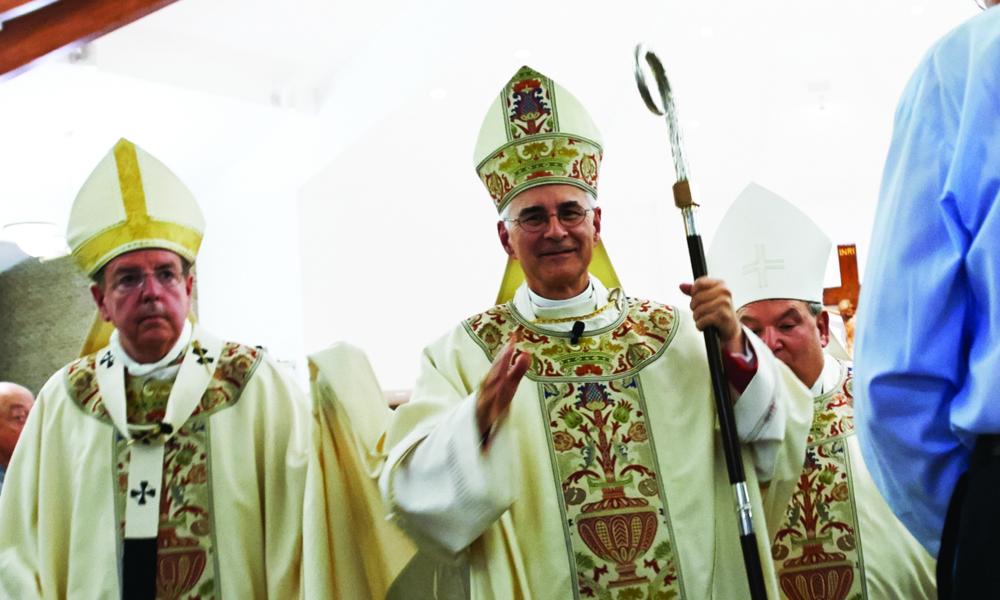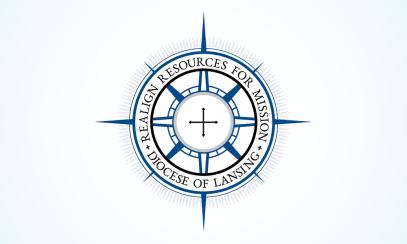
Lansing's chancellor now Gaylord's bishop - Most Reverend Steven Raica
Most Reverend Steven Raica, formerly Chancellor of the Diocese of Lansing, was ordained and installed as the fifth Bishop of Gaylord on Aug. 29, 2014 at St. Mary Cathedral in Gaylord. FAITH’s Elizabeth Solsburg interviewed Bishop Raica.
What was your reaction when you received the call from the nuncio appointing you as bishop of the Diocese of Gaylord? It was surprise and disbelief. I kept pinching myself because it seemed like a dream. The call came from Sister Mary at the Nunciature to my secretary, Julie Fech, asking for me to return the call urgently. I thought it was about another matter, but when I called back, Sister Mary transferred me immediately to the nuncio who informed me about Pope Francis’ decision to name me Bishop of Gaylord.
There are so many unknowns for one to be appointed “bishop”. It will be different for me to be the one calling the balls and strikes, so to speak, rather than having a more supportive role in the Bishop’s Office. I’ve spent a lot of time reading and re-reading Apostolorum Successores, which is almost like an instruction manual for new bishops. The most common phrase in it is, “The bishop should …” But bishops fortunately have people in the diocesan offices who cooperate with their ministry of teaching, governing and sanctifying. These people become the extensions of the bishop and his ministry – so that all the “shoulds” can be accomplished with some concerted coordination.
What are you most mindful of as you start your new ministry as bishop? I am particularly mindful of trying not to leave anyone behind or to overlook legitimate requests and needs as they emerge. I know I will be stretched and pulled, and that can be a bit of a challenge, particularly in the wintertime!. In Gaylord, I will put more miles on a car than I did in Lansing. With Northern Michigan winters, it will be more challenging to travel. Nonetheless, I am mindful of trying to be present to as many people as possible notwithstanding the distances involved.
How were you called to the priesthood? I was inspired by the Adrian Dominican sisters who taught at Sacred Heart Elementary School in Munising and the local priests. While at the parish, I was involved as an altar boy and, during my high school years, as the organist of the parish. We had a reasonably active youth group. The parish had perpetual adoration. Overall, there was a pride in the parish in the local community. In addition, my own prayer life led me to consider the prospect of becoming a priest. The Adrian Dominican sisters in my school invited us to consider a religious vocation. They put us in touch with people who could talk with us about that possibility. All along, I also wanted to obtain a degree in mathematics and secondary education at the university. My local parish priests, school counselors and friends told me that if a priestly vocation was there, the Lord would hound you. And that is exactly what happened. At Michigan State University, I participated at St. John Student Parish and other activities in Lansing. They encouraged me to pursue priesthood.
Interestingly, the person who sat next to me in my very first class in German 101 at MSU was named George Michalek. We became friends and eventually entered the seminary at the same time. We were ordained together in October 1978. He is now Msgr. Michalek, the judicial vicar for the Diocese of Lansing.
How has being a pastor as well as chancellor prepared your for this role? A pastor is often on the front lines, i.e., he is engaged in parochial life, he knows his parishioners, or as Pope Francis would say, “has the ‘smell of the sheep’”. Those experiences of “doing” priesthood helped me to understand the a number of the issues facing those we serve. As a chancellor, I acted as the person in the “back room” providing support to enable pastors to do what they need to do in order to shepherd, teach and sanctify in their parishes. The parish is a microcosm and the diocese the macrocosm of Church life. In it all, the joys and hopes, anguish and despair of life is addressed through our meeting and encounter with Christ.
Why did you choose your motto, Sursum Corda? I had a list of potential mottos under consideration. I narrowed it down to this one because of its simplicity and its tie to liturgical action. My whole life has been taken up with the liturgy – from altar boy, to choir, to organist, to priesthood. In its literal translation it means, “hearts up” – very simple. Also, the Sacred Heart has been such an integral part of my life that I wanted to say something about “hearts.” It was the name of my parish and my seminary and the North American College, whose motto is “Steadfast is my heart.” So “corda” stitched together those experiences of my past. “Up” is such a positive direction. As we now say, “Lift up your hearts!” For me it represents a positive and optimistic response to the invitation of Christ – “Lift up your hearts!” And our response is challenging enough, “We have lifted them up to the Lord!”
Can you tell us about your family? A couple of days before the public announcement, I called my mother and told her I was leaving the Diocese of Lansing! Then I told her the reason why. Her response was, “I am so happy for you … but I have to get a new dress!” I used to tease her that she could stop lighting candles at church because I knew she was praying for my return Up North after I retired. Now she really can stop! My mother Mary is 87 and lives in Marquette with my brother Joe. Both have lived in the U.P. their entire lives. I left when I was 17 to attend Michigan State and haven’t lived in the U.P. since. Mom taught fourth-grade in the public elementary school in Munising. My younger brother, Joseph, works at Duke Lifepoint Hospital in Marquette. My father, Steve, was a laborer at Kimberly Clark paper products. He enjoyed fishing, especially ice fishing on Lake Superior. He passed away unexpectedly in 1987.
Is there anything else you would like to share? I will never be able to adequately express my gratitude to the lay people, priests and religious of the Diocese of Lansing who have been part of my life. They have walked with me, formed me. They have been with me in the ups and downs of life. I have an enormous debt of gratitude and thanks for them that I don’t know if I will ever be able to repay adequately except to express my deep gratitude to them and to keep their intentions in my prayers.
And to the people of Gaylord, I am praying for all of you that this will be the beginning of a wonderful experience of Christian faith and life. Let us journey with the Lord together. … Lift up your hearts!



